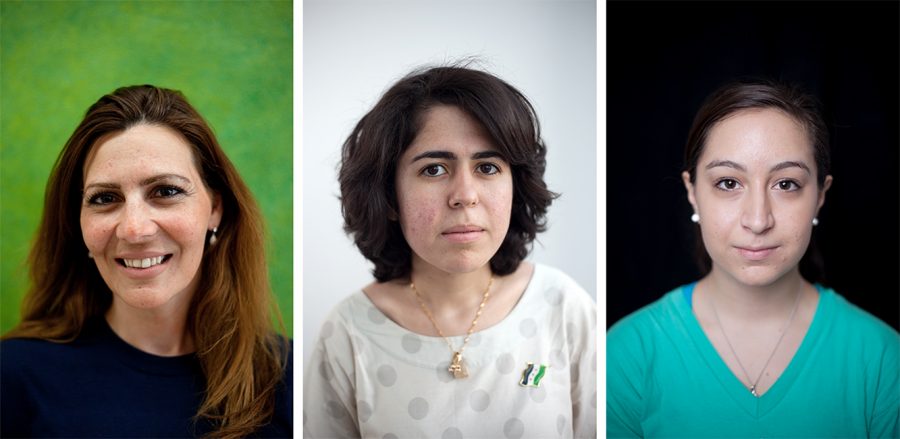President Barack Obama has called for Congress to delay its vote on his request for permission to make a limited strike against President Bashar al-Assad’s regime in Syria in response to the regime’s use of chemical weapons on civilians. The conflict hits close to home for three UT students — one Syrian immigrant and two Syrian-Americans — who have focused their attention on humanitarian relief and activism efforts in response to the conflict.
Mouna Hashem Akil
For senior Mouna Akil, the war in Syria gives significance to the degrees in business and psychology she’s pursuing. Akil, a Syrian immigrant, said she hopes to use her education to help Syria rebuild after the war. In the meantime, she’s leading humanitarian efforts from the U.S.
When protests first broke out on the streets of Syria in 2011, Akil said she wanted to take action and help in any way she could. Two years later, Akil is now the director of Watan-USA.
The organization focuses on long-term civil and humanitarian work that will benefit the Syrian people, Akil said.
“We try to rebuild the country, empower women and men and adults [and] those who are refugees,” Akil said.
With her education at UT in tow, she plans to return to Syria once the war ends and work with children affected by the turmoil.
“I want to focus on the children, [the] child psychology aspect, so when I go back, hopefully, I can help those thousands and thousands of kids who are refugees and orphans who lost their families and homes due to the shelling,” Akil said.
Akil said the hardships of those suffering abroad help her overcome the hardships she faces at home leading a humanitarian effort while still in school and raising two boys.
“You cannot compare this to what people are going through inside Syria,” Akil said. “That’s what drives it, [what] drives me to keep up the work and continue with what I do.”
Shiyam Galyon
A Syrian-American, Shiyam Galyon was born and raised in Houston. Her parents immigrated to the United States from Homs, Syria, more than 30 years ago. Following her graduation from UT last year, Galyon decided to involve herself with relief efforts in Syria (Galyon is a former Daily Texan staffer).
“All I could think about was Syria and I just wanted to get over there,” Galyon said.
But no nonprofit would accept her offer to teach English at the Syrian border for free because of liability issues. Galyon’s family and networking led her to the UK-based humanitarian group Watan.
Galyon found herself in a war-torn country and involved in relief work on the Syria-Turkey border.
“We spent the night with shells hitting our neighborhood,” Galyon said.
While working with a civilian council in Aleppo, Galyon said she realized the turmoil in the area had become an inescapable aspect of everyday life for the individuals she met there, including a student from the University of Aleppo named Mohammed.
“By the end of that week, I could step out of that area and I could go, but he couldn’t,” Galyon said. “And I think that’s the fundamental idea behind privilege.”
Since returning to the U.S., Galyon continues to work with Watan and the Houston chapter of the Syrian American Council as a media relations officer while taking classes at the University.
The chemical attacks have pushed Syria into the media spotlight. While Galyon said the rhetoric surrounding the crisis in Syria has improved, she said there isn’t a clear understanding of the current situation.
“I always try to think what a non-Syrian might feel,” Galyon said. “There is still a lot of education to do.”
After the chemical weapons attack, Galyon and the council have organized rallies in response to the anti-war rallies that broke out across the country.
“We don’t believe those rallies are organized behind a rhetoric that fully understands the Syrian situation,” Galyon said. “Everybody is talking politics about a humanitarian crisis and the people who are going to lose out at the end of the day are the Syrian people.”
Nadia Husayni
Business senior Nadia Husayni’s roots and extended family are based in Syria. Traveling to Homs every summer meant family reunions and days spent in the mountains and beaches.
But most of her extended family fled to Saudi Arabia, Lebanon, Jordan and Dubai when protests broke out in the area in early 2011.
“When the conflicts first happened, my parents told me, ‘Don’t post anything on social media,’ because whenever someone would post about social media, the government would go and find the family [and] either harass them or invade their home,” Husayni said.
A mutual friend connected Husayni with Akil. Since then, she’s been involved in activism efforts on campus.
Two days after students of University of Aleppo were killed in a bombing on Jan. 15, Husayni participated in a vigil held in front of the UT Tower.
Husayni has helped Akil table in the West Mall where they talked to other students and helped raise awareness for the crisis in Syria.
“I strongly do encourage people to look at the facts, to look at the numbers, look at what’s happening over there [because] the violence is not acceptable,” Husayni said.
Moving forward, Husayni said she hopes to continue working with Akil because the activism work has helped her develop her perspective on the situation in Syria.
“She kind of helped me voice out my opinions,” Husayni said. “Before, I was really afraid just because my parents told me, ‘You need to watch out.’”















